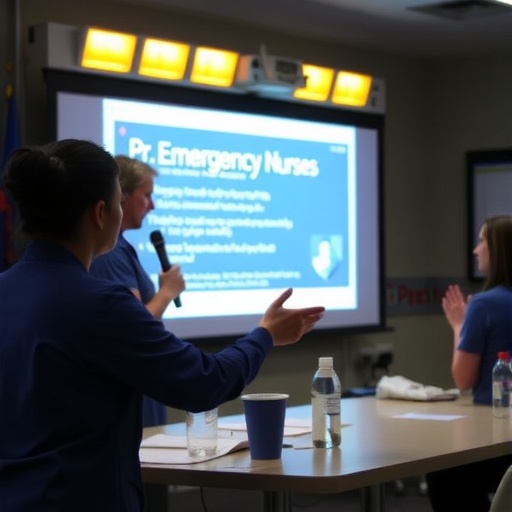In an era where the demands of healthcare professionals are at an all-time high, understanding the lived experiences of those on the front lines is crucial. The phenomenon of presenteeism, where employees show up to work while unwell or unable to perform at their best, has gained significant attention in recent years. Among these dedicated professionals, emergency nurses often experience this issue more acutely, facing a unique set of challenges and ethical dilemmas. A recent qualitative study conducted by a team of researchers has delved into this pressing topic, shedding light on the nuances of presenteeism within the context of emergency nursing.
Emergency nurses are critical to the fabric of healthcare, providing immediate care in life-threatening situations. However, their commitment to their roles often leads to a troubling paradox. The dedication may encourage them to prioritize their work over their health, contributing to presenteeism. The qualitative study explores how emergency nurses navigate their responsibilities while dealing with personal health issues, highlighting the tensions between professional obligations and personal well-being. This research is particularly timely as healthcare systems worldwide strain under pressure, making it essential to understand the implications of presenteeism on both staff and patient outcomes.
Through in-depth interviews and thematic analysis, the researchers gathered narratives from emergency nurses who shared their experiences candidly. These stories revealed a common thread of overwhelming duty—many nurses felt an ethical obligation to maintain their presence at work even when experiencing physical or mental health challenges. The fear of disrupting workflow or letting down colleagues and patients contributed significantly to this mindset. The study illuminates how this self-sacrificial attitude can lead to a cycle of burnout and decreased job satisfaction, ultimately impacting the quality of patient care.
The study’s findings revealed that many emergency nurses perceive their work environment as one that discourages taking time off for illness. The culture within many healthcare settings often valorizes martyrdom, where showing up for work, regardless of personal health challenges, is seen as a badge of honor. This mentality not only endangers the health of the nurses themselves but also raises concerns about the safety and effectiveness of care delivered to patients. By examining attendees’ experiences, the study effectively challenges the existing norms around work attendance, calling for a reevaluation of expectations placed on healthcare workers.
Furthermore, the study identified several underlying factors contributing to presenteeism among emergency nurses. High-stakes responsibilities, due to the nature of the work, create immense pressure to deliver care without fail. Compounding these challenges are staffing shortages and increasing patient loads, making it difficult for nurses to prioritize their well-being. When nurses feel they cannot afford to take sick leave, they are more prone to showing up to work while unwell, thereby perpetuating a culture of presenteeism that can have far-reaching consequences.
Moreover, the emotional toll of working in high-pressure environments, coupled with the stigma associated with taking sick leave, exacerbates the issue. Emergency nurses often feel that their colleagues may judge them for taking time off, which reinforces the perception that they must continually present themselves at work despite their struggles. This mentality undermines the importance of self-care and resilience, further entrenching the problems associated with presenteeism within the nursing sector.
The implications of presenteeism extend beyond individual nurses and affect the overall healthcare system. When nurses work while unwell, they may not perform at their full capacity, which can jeopardize patient safety and care standards. Recognizing this, health administrators must prioritize creating a supportive atmosphere where taking sick leave is normalized rather than frowned upon. Revisiting policies on sick leave and championing a culture that celebrates well-being could significantly enhance the overall effectiveness of healthcare delivery.
In response to the findings, the researchers advocate for comprehensive strategies to address presenteeism. Training programs focused on mental health awareness and resilience practices among healthcare professionals could foster a work environment more conducive to self-care. Encouraging open dialogues about health, wellness, and the importance of taking time for recovery is essential in shifting the prevailing attitudes towards presenteeism.
Furthermore, the introduction of flexible work policies could also mitigate the impacts of presenteeism. By allowing nurses to work adjusted schedules or offering remote opportunities when feasible, healthcare systems can support their staff’s health without compromising patient care. Engaging with nurses to develop these policies ensures that solutions are tailored to the specific challenges they face on the ground, thereby improving morale and retention.
As the healthcare landscape evolves, the study highlights the urgent need to prioritize nurse well-being to foster a resilient workforce. It is essential that stakeholders within the healthcare system recognize the pressing nature of presenteeism and work collaboratively to create an environment where nurses can thrive in both their professional and personal lives. Shifting perspectives on what it means to be a dedicated healthcare provider could ultimately lead to stronger, more sustainable healthcare systems, ultimately benefiting both staff and patients.
In conclusion, the qualitative study on presenteeism among emergency nurses presents vital insights into a critical issue that extends far beyond individual health and wellness. By examining the lived experiences of these dedicated professionals, the research sheds light on the broader implications of workplace expectations and the urgent need for a supportive health system. If the healthcare industry can shift its cultural attitudes toward presenteeism, it may pave the way for a healthier, more effective nursing workforce, ultimately leading to better patient outcomes. This research not only highlights the importance of self-care among emergency nurses but also paves the way for necessary systemic reforms within the healthcare sector.
Subject of Research: Presenteeism among emergency nurses
Article Title: The lived experience of presenteeism among emergency nurses: a qualitative study
Article References: Hou, H., Jiang, Y., Xia, C. et al. The lived experience of presenteeism among emergency nurses: a qualitative study. BMC Nurs 24, 1255 (2025). https://doi.org/10.1186/s12912-025-03902-3
Image Credits: AI Generated
DOI: 10.1186/s12912-025-03902-3
Keywords: presenteeism, emergency nurses, qualitative study, healthcare, well-being, burnout, patient safety




